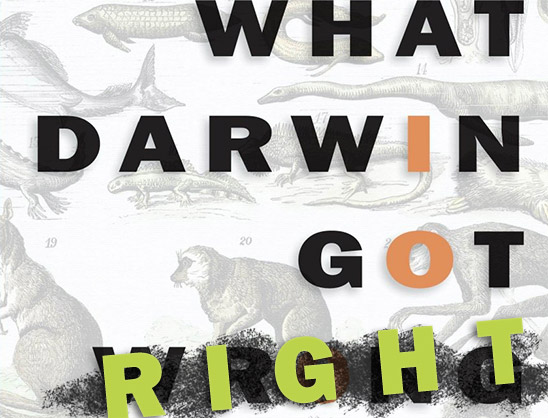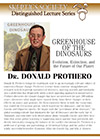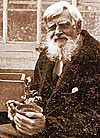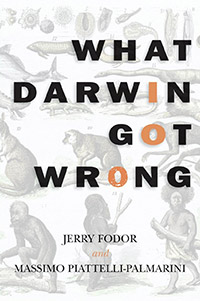In this week’s eSkeptic:
In this week’s eSkeptic, Dr. Donald R. Prothero reviews What Darwin Got Wrong, by Jerry Fodor and Massimo Piatelli-Palmarini.
Dr. Donald R. Prothero is Professor of Geology at Occidental College in Los Angeles, and Lecturer in Geobiology at the California Institute of Technology in Pasadena. He earned M.A., M.Phil., and Ph.D. degrees in geological sciences from Columbia University in 1982, and a B.A. in geology and biology (highest honors, Phi Beta Kappa) from the University of California, Riverside. Continued reading bio at end of article…

If you don’t understand evolutionary biology, don’t write a book about it!
by Donald R. Prothero
THE DARWIN CELEBRATIONS OF 2009 led to a glut of books about evolution, which took a wide variety of approaches. Most books were written by biologists, paleontologists, or historians trained in the subject; others were written by the creationists trying to counter all the Darwin publicity. Yet there are books that fall into neither of these categories. What Darwin Got Wrong by Jerry Fodor and Massimo Piatelli-Palmarini (abbreviated FPP hereafter) is a wrongheaded effort by a philosopher and a cognitive scientist (neither of whom has any firsthand research experience relevant to evolutionary biology) to critique natural selection.
The confusion begins with the title. The authors state up front that they are both atheists, accept the fact that life has evolved, and do not agree with creationism or “intelligent design”—yet they used a title that is bound to boost sales by giving creationists the impression that this is a serious scientific critique of evolutionary biology. In particular, the use of Darwin’s name in the title (talking about “Darwinism” rather than modern evolutionary biology, or even 1950s-style “Neo-Darwinism”) is a classic creationist tactic. In fact, modern evolutionary biology only vaguely resembles what Darwin thought 150 years ago. So what if Darwin got a few things wrong? We’ve learned a lot in the past century and a half! What is remarkable is how much Darwin got right despite the fact that he knew nothing about genetics, and very little about the fossil record. Throughout the book, FPP resurrect some of the hoariest discredited creationist arguments (such as “natural selection is tautological”), showing that they have not only failed to acquire any relevant training in evolutionary biology, but also have not understood the standard responses to these creationist canards.
Since FPP don’t deny that life has evolved, or that all life is related by a patterns of ancestry and descent (the chief issue that bothers creationists), FPP’s entire convoluted argument is against Darwin’s main mechanism for evolution, natural selection. There are some evolutionary biologists who have argued that natural selection is not the exclusive explanation for all aspects of life’s evolution, from Stuart Kauffman’s emphasis on natural self-organizing systems, to Stephen Jay Gould’s push to recognize contingency and hierarchy in evolutionary biology. But none of these scientists questions the idea that natural selection is real, or that it has a very important role to play in the evolution of new species. FPP review many of the recent developments in evolutionary biology, from neutralism to group selection to self-organizing systems to jumping genes to evo-devo. These important scientific discoveries have certainly broadened our understanding of how evolution works, but none of the people who made these discoveries doubt that natural selection still plays an important role in the process of evolution.
In effect, what FPP are suggesting is that each time we learn more about the evolutionary process, all of what we knew before must have been wrong! There are some instances (known as “scientific revolutions”) where scientific discoveries have radically changed the foundation of a field and thrown out the entire paradigm, but none of the examples the FPP discuss are of that nature. They are simply challenges to a narrow and restrictive form of Neo-Darwinism, not to the basic premise that natural selection is a very important (if not the most important) component of evolutionary change.
Much of the book consists of beating dead horses and straw men as if biology has learned nothing since the 1950s. FPP talk about gene linkages and “free rides” of one gene upon another, about the laws of form and Fibonacci series in organisms, and about endogenous factors affecting form and development despite the fact that biologists have been working hard for many years to understand and explain these phenomena. If FPP bothered to read any of the recent literature on these subjects over the past 30 years, they would have found that these phenomena are pretty well understood. They do not force us to throw out the baby of natural selection with the bathwater of the failed ideas that evolutionary biology has rejected.
To FPP, the fundamental problem is this: how do we decide which features are selected for, and which ones are “free riders” invisible to natural selection? In their approach, if most of evolution is about “free riders” that are not selected for or against, then natural selection is irrelevant. They discuss the classic 1979 paper by Stephen Jay Gould and Richard Lewontin, “The Spandrels of San Marco: A Critique of the Adaptationist Programme.” In that paper, Gould and Lewontin were criticizing the then-prevalent naïve form of extreme panselectionism in which every tiny aspect of an organism was presumed to be subject to natural selection in some way, even if we can’t detect it. Gould and Lewontin rightly pointed out that (like the spandrels which are functional byproducts of two arches meeting), many features of organisms are due to structural or functional constraints, and we should not assume that such features are fine-tuned by natural selection. Most evolutionary biologists have taken the Gould and Lewontin (1979) paper in the spirit in which it was intended, and there is plenty of research now into functional/ structural constraints. When I attend professional meetings, I find very little of the naïve panselectionism that I encountered in my evolution classes and textbooks of the 1970s.
Yet FPP take the Gould/Lewontin critique too far, and make the absurd claim that because some features are possibly constrained and not fine-tuned by natural selection, we cannot assume that natural selection works anywhere. What about all those studies that demonstrate tight correlations of cause and effect between a feature and the selective response that occurs when nature intervenes? According to FPP, these are not conclusive enough. Therefore, whenever we have a large data set that shows a strong correlation between say, obesity and heart disease, or increases in carbon dioxide and global warming, we cannot even begin to suggest that there might be a causal connection. If this is the angle that FPP are pushing, then they have a dispute with almost all of science, not just evolutionary biology.
Their claim is that if we see an apparent feature of an organism, and then determine what natural selection does to organisms which possess this feature, we cannot rule out the possibility that there was some unknown, invisible characteristic of the organism that caused differential survival, rather than the obvious conclusion that it was due to natural selection on the features we can study. This is false on several counts. First of all, there are many experiments (not acknowledged by FPP) that have done careful work with controls and minimizing the variables that conclusively show natural selection to be the only reasonable explanation for the results. And secondly, what are these alleged “invisible forces” that might explain survival better than natural selection? How the heck do we evaluate them? In FPP’s view, natural selection is a fine-tuned discriminator that can tell the difference between all these arbitrary categories that philosophers with no experience in biology can imagine. In reality, natural selection is a coarse filter. Some features of an organism appear to make a difference, and others are indeed free riders. But the overwhelming evidence of 30 years’ worth of natural and laboratory experiments show that natural selection indeed works, and there is no practical reason to worry about “invisible” (and untestable) causes when a clear cause-and-effect chain has been established.
If you found the previous discussion confusing and hard to follow, it is no accident. The thinking and writing of FPP are so muddled and verbose and confusing that most people (including most evolutionary biologists who reviewed it) couldn’t make much sense of the book, either. In fact, FPP raise points that amount to philosophical hair-splitting and make no real difference to practicing biologists.
There are many instances of where philosophers can contribute insights to the activities of others. But in the philosophy of science, it is much trickier. Some philosophers have built whole careers out of trying to explain what scientists should do, without any regard to the reality of what scientists actually do. Yet scientists keep on making big discoveries and changing our world, oblivious to philosophers who waste time arguing about idealized views of science. Here we see another examples of outsiders like FPP who would be well advised to spend some time doing real evolutionary biology, and becoming familiar with the recent research and debates, instead of beating dead horses (such as 1960s–1970s panselectionism) and strawmen arguments from 40 years ago.
Even more annoying is the fact that FPP don’t give evolutionary biologists much credit for understanding what they do, modifying their approaches as new fields such as evo-devo have appeared, and being careful and self-critical not to overextend their conclusions. Most biologists are very cautious about asserting cause and effect relationships between some feature and natural selection unless they have done all the necessary controls and dealt with all the variables; otherwise, their work would not pass peer review and be published. As their confusion and errors clearly demonstrate, FPP are outsiders with a distorted, mistaken view of the entire field who don’t understand the field well enough to level valid criticisms. When they have done their homework and acquired the relevant training, then the evolutionary biology community might take them seriously.
About Donald R. Prothero
Prothero is Professor of Geology at Occidental College in Los Angeles, and Lecturer in Geobiology at the California Institute of Technology in Pasadena. He earned M.A., M.Phil., and Ph.D. degrees in geological sciences from Columbia University in 1982, and a B.A. in geology and biology (highest honors, Phi Beta Kappa) from the University of California, Riverside. He is currently the author, co-author, editor, or co-editor of 25 books and over 200 scientific papers, including five leading geology textbooks and three trade books as well as edited symposium volumes and other technical works. He is on the editorial board of Skeptic magazine, and in the past has served as an associate or technical editor for Geology, Paleobiology and Journal of Paleontology. He is a Fellow of the Geological Society of America, the Paleontological Society, and the Linnaean Society of London, and has also received fellowships from the Guggenheim Foundation and the National Science Foundation. He has served as the Vice President of the Pacific Section of SEPM (Society of Sedimentary Geology), and five years as the Program Chair for the Society of Vertebrate Paleontology. In 1991, he received the Schuchert Award of the Paleontological Society for the outstanding paleontologist under the age of 40. He has also been featured on several television documentaries, including episodes of Paleoworld (BBC), Prehistoric Monsters Revealed (History Channel), Entelodon and Hyaenodon (National Geographic Channel) and Walking with Prehistoric Beasts (BBC).
Skeptical perspectives on Darwin and Evolution
-
 Greenhouse of the Dinosaurs
Greenhouse of the Dinosaurs
Evolution, Extinction, and the Future of Our Planet
(DVD $23.95 CD $15.95) with Dr. Donald Prothero
-
 Evolution: A Journey into Where We’re From
Evolution: A Journey into Where We’re From
and Where We’re Going
(4-DVD set $99.95) 8-hour PBS special
-
 In Darwin’s Shadow: The Life and Science
In Darwin’s Shadow: The Life and Science
of Alfred Russel Wallace
(DVD $23.95) with Dr. Michael Shermer

NEW ON SKEPTICBLOG.ORG
Bring on the Science of Honey and Vinegar
In this week’s Skepticblog, Daniel Loxton continues the discussion about the ethical implications and efficacy of various communication strategies by challenging skeptics of all kinds to always support their statements with the data (and a nice, big toothy smile).

NEW ON MICHAELSHERMER.COM
When Scientists Sin
Why do some scientists lie, deceived and commit fraud? Are they purposefully injecting falsehoods into science or do they truly believe their findings are accurate? Check out Michael Shermer’s July Scientific American column and find out why science is (mostly) self-correcting.











